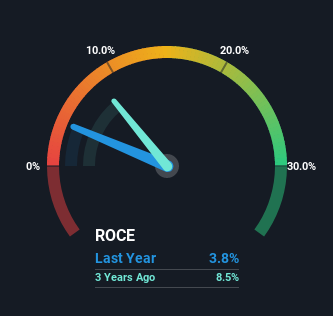- Israel
- /
- Aerospace & Defense
- /
- TASE:BSEN
Be Wary Of Bet Shemesh Engines Holdings (1997) (TLV:BSEN) And Its Returns On Capital

What trends should we look for it we want to identify stocks that can multiply in value over the long term? Amongst other things, we'll want to see two things; firstly, a growing return on capital employed (ROCE) and secondly, an expansion in the company's amount of capital employed. This shows us that it's a compounding machine, able to continually reinvest its earnings back into the business and generate higher returns. Although, when we looked at Bet Shemesh Engines Holdings (1997) (TLV:BSEN), it didn't seem to tick all of these boxes.
Understanding Return On Capital Employed (ROCE)
Just to clarify if you're unsure, ROCE is a metric for evaluating how much pre-tax income (in percentage terms) a company earns on the capital invested in its business. Analysts use this formula to calculate it for Bet Shemesh Engines Holdings (1997):
Return on Capital Employed = Earnings Before Interest and Tax (EBIT) ÷ (Total Assets - Current Liabilities)
0.038 = US$7.0m ÷ (US$263m - US$78m) (Based on the trailing twelve months to December 2022).
Therefore, Bet Shemesh Engines Holdings (1997) has an ROCE of 3.8%. In absolute terms, that's a low return and it also under-performs the Aerospace & Defense industry average of 14%.
See our latest analysis for Bet Shemesh Engines Holdings (1997)

While the past is not representative of the future, it can be helpful to know how a company has performed historically, which is why we have this chart above. If you're interested in investigating Bet Shemesh Engines Holdings (1997)'s past further, check out this free graph of past earnings, revenue and cash flow.
What Can We Tell From Bet Shemesh Engines Holdings (1997)'s ROCE Trend?
On the surface, the trend of ROCE at Bet Shemesh Engines Holdings (1997) doesn't inspire confidence. Over the last five years, returns on capital have decreased to 3.8% from 13% five years ago. However, given capital employed and revenue have both increased it appears that the business is currently pursuing growth, at the consequence of short term returns. And if the increased capital generates additional returns, the business, and thus shareholders, will benefit in the long run.
What We Can Learn From Bet Shemesh Engines Holdings (1997)'s ROCE
In summary, despite lower returns in the short term, we're encouraged to see that Bet Shemesh Engines Holdings (1997) is reinvesting for growth and has higher sales as a result. These trends are starting to be recognized by investors since the stock has delivered a 14% gain to shareholders who've held over the last five years. Therefore we'd recommend looking further into this stock to confirm if it has the makings of a good investment.
If you want to continue researching Bet Shemesh Engines Holdings (1997), you might be interested to know about the 2 warning signs that our analysis has discovered.
While Bet Shemesh Engines Holdings (1997) may not currently earn the highest returns, we've compiled a list of companies that currently earn more than 25% return on equity. Check out this free list here.
If you're looking to trade Bet Shemesh Engines Holdings (1997), open an account with the lowest-cost platform trusted by professionals, Interactive Brokers.
With clients in over 200 countries and territories, and access to 160 markets, IBKR lets you trade stocks, options, futures, forex, bonds and funds from a single integrated account.
Enjoy no hidden fees, no account minimums, and FX conversion rates as low as 0.03%, far better than what most brokers offer.
Sponsored ContentValuation is complex, but we're here to simplify it.
Discover if Bet Shemesh Engines Holdings (1997) might be undervalued or overvalued with our detailed analysis, featuring fair value estimates, potential risks, dividends, insider trades, and its financial condition.
Access Free AnalysisHave feedback on this article? Concerned about the content? Get in touch with us directly. Alternatively, email editorial-team (at) simplywallst.com.
This article by Simply Wall St is general in nature. We provide commentary based on historical data and analyst forecasts only using an unbiased methodology and our articles are not intended to be financial advice. It does not constitute a recommendation to buy or sell any stock, and does not take account of your objectives, or your financial situation. We aim to bring you long-term focused analysis driven by fundamental data. Note that our analysis may not factor in the latest price-sensitive company announcements or qualitative material. Simply Wall St has no position in any stocks mentioned.
About TASE:BSEN
Bet Shemesh Engines Holdings (1997)
Manufactures and sells jet engine parts in Israel.
Flawless balance sheet and fair value.
Market Insights
Community Narratives



